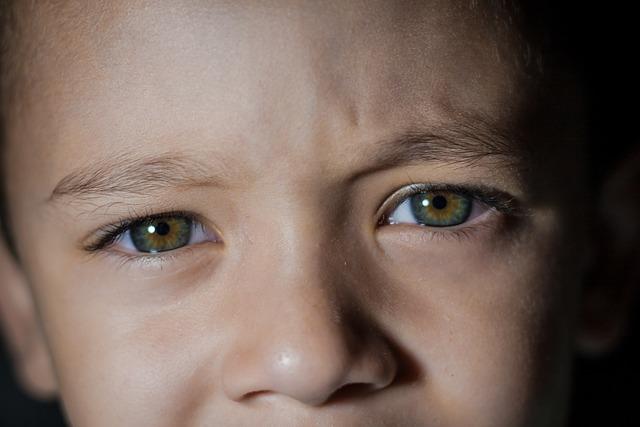
Since our children are little, parents teach them a series of hygiene routines they learn each day and incorporate into their daily lives. In this way, gestures such as washing your hands, brushing your teeth, or taking a shower are essential habits to take care of your body and your health. But the same does not usually happen with the eyes. In fact, experts lament that this important part of the body is generally the one that is forgotten in children’s daily grooming routines. However, maintaining your child’s eye health is as vital as taking care of other parts of their body.
The school year begins, and the hours of concentration increase for your kids. Readings, homework, and jobs await them, which is a double effort for the visual system.
During the first 12 years of life, 80% of everything children learn is thanks to the sense of vision. Furthermore, in this blog, God Service Eye Clinic will guide how to take care of your children’s eye health.
Common Vision Disorders Among Children
The most common vision disorders among children are usually refractive errors, such as:
- Myopia: poor vision from a distance
- Farsightedness or astigmatism: difficulty to focus correctly either from afar or from near.
- Disorders such as amblyopia or lazy eye: one eye has less visual strength than the other.
- Strabismus: deviation of one eye.
When the eyes get tired, they warn us of headaches, fluctuating pain, double vision, tiredness, or visual redness. That is why it is important to take care of the eyes of your little ones also while they do their homework and study.
How to detect vision problems in children?
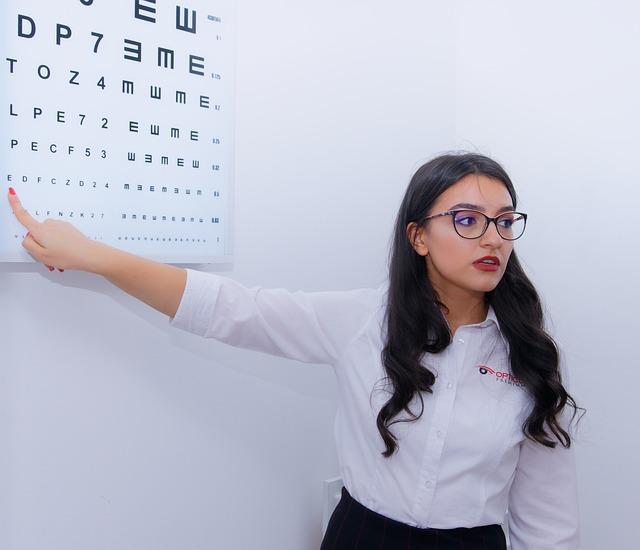
It is estimated that between 15 and 30% of school failure is due to visual problems. For this reason, it is important to be attentive to the signs to identify a visual problem at an early age, such as:
- Excessive blinking or the child rubbing his eyes excessively
- Tendency of leaning forward to fix the view.
- Squinting to look or focus.
- Frequent headaches, dizziness, or nausea.
- Tendency to get very close to the texts to be able to read well.
- Excessive redness in the eyes.
- Deviation of one of the eyes.
- Loss of attention, learning problems, and concentration on tasks.
You might also like to read: Soft Skills Your Child Needs for Success
How to take care of children's eyesight while doing homework
Keeping kids away from digital gadgets is a huge challenge for parents these days. However, by making certain changes in your child’s habits and routine, you can surely avoid eye problems in your kids.
In this blog, I am sharing a few eye care tips that will help you maintain your child’s eye health.
1. Maintain an adequate diet

A complete diet helps to have optimal health. Eating fruits and vegetables and a diet rich in vitamins is important to take care of the general and visual health of your little ones.
2. Watch the lighting
Poor lighting strains the eyes, tiring easily and producing visual disorders. It is necessary to avoid the direct lights that generate reflections in the lamp shades, so that they do not face the eyes. It is also better to use white or warm-colored lamps than transparent bulbs.
3. Keep your eyes hydrated
Ocular moisture is achieved by forced blinking. If they have been doing a task for a long time, especially with the computer, it is necessary to blink and rest. Encourage your child to blink their eyes often to keep their eyes hydrated.
4. Use a good posture
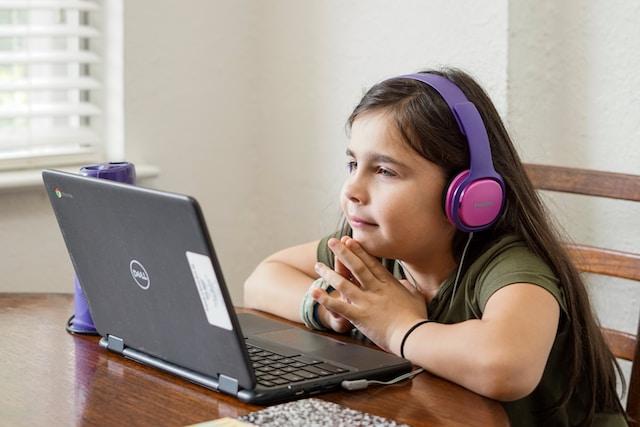
It is important to promote habits in your child to have a good posture while doing homework. Avoiding cervical and visual problems depends on it. Your child must sit properly, at a sufficient height from the table, with their back straight at an angle of 90º with their feet touching the ground.
5. Watch the distance
- The distance from the eyes to the reading, writing, mobile or tablet should be about 35 cm (distance from the elbow to the hand).
- The distance from the eyes to laptops should be somewhat greater. From about 40 to 45 cm and desktop computers from 45 to 55 cm.
Make sure your child maintains an appropriate distance from the device while working on it to avoid eye problems.
6. Brightness of Your Devices
Take care of the lighting of electronic devices. Excess brightness or too low brightness can lead to vision problems in your child. The screens must be configured with adequate brightness and contrast values.
You might also like to read: How to reduce your kids’ screen time
7. Avoid studying or reading efforts when children are too tired
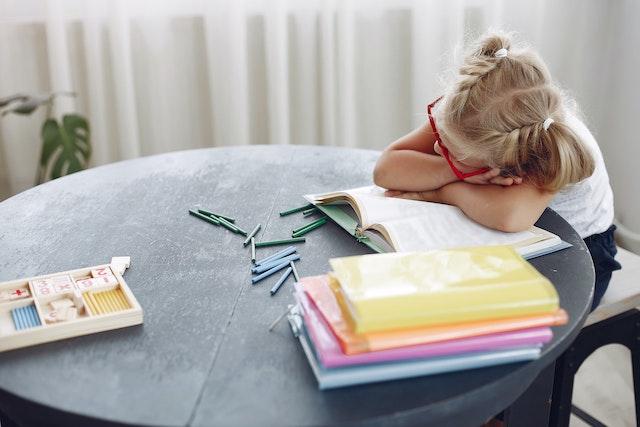
Let your child rest well and have a good sleep if they are tired. It is better to wait half an hour after getting up in the morning to concentrate on their work. If they are extremely tired at night, it is better to finish homework the next day.
8. Rest your eyesight
At least after every 30 minutes of study, homework, or video games, your child should rest for 5 minutes relaxing their near vision while looking from afar. The 20-20-20 rule can be a good way to relax your eyes: rest your eyes for 20 seconds every 20 minutes, looking at a point 20 feet (6 meters).
9. Wear blue light glasses, prescription glasses, and sunglasses
It is recommended that if your child needs glasses, it is with a valid prescription, the use of quality anti-reflective glasses and approved sunglasses to protect the eyes from solar UV radiation. Even if the little one does not use a prescription, it is possible to use glasses with a filter for blue light.
10. Encourage outdoor tasks and limit screen time

Outdoor activities have been shown to improve visual health. Keeping your kids engaged in physical activities will not only keep them fit, but also make them less inclined, or tempted, to use digital devices. Also, refraining from excessive use of the computer, tablet or video games, which will help you rest your eyes.
You might also like to read: Best Family Board Games for Children
11. Get your child's eye check ups done regularly
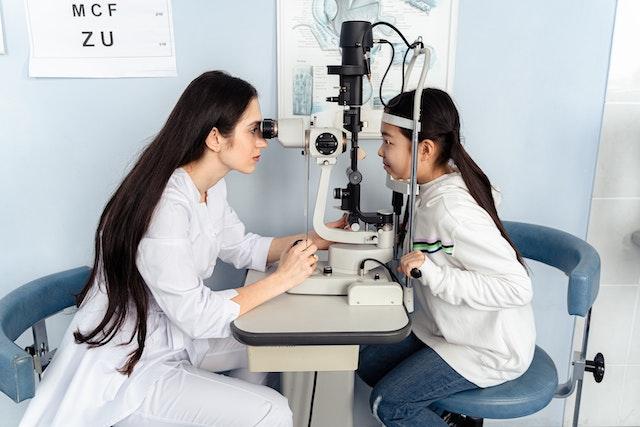
While you take best care of your children’s eye health, it is always good to take them for a routine eye check up regularly. Check your children’s eye sight often, with a specialist in optics and optometry.
Wrapping It Up
Protecting your children’s eye health is crucial for every parent. Being a responsible parent, be vigilant about your kids’ habits and routines. Set rules to limit their screen time and help them maintain a healthy routine. Maintaining appropriate distance from digital devices, adjusting the brightness of your device, frequent blinking of eyes, good posture while reading, and regular eye check ups will keep your children away from eye problems. Not to forget, a healthy balanced diet, sufficient rest, and good sleep are most important for your child’s eye health.